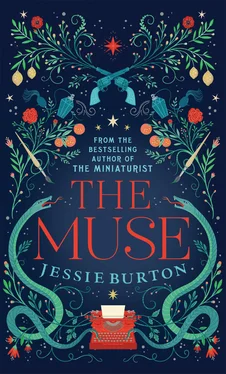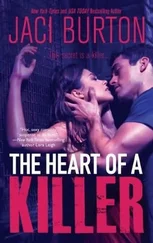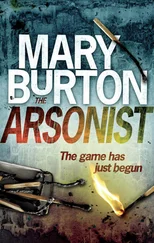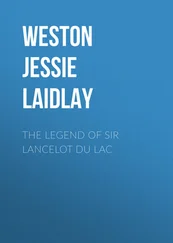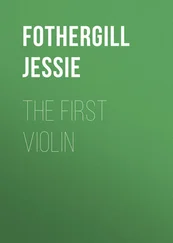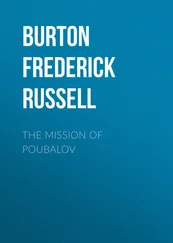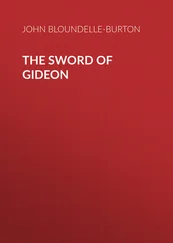‘But you can’t prove this is a Robles,’ Quick said.
Reede narrowed his eyes at her. ‘Right at the moment, I can’t, Marjorie. But there are avenues. He painted other pictures. It’s a case of tracking them down and lining this up with them. Your mother is — recently deceased, I understand, Mr Scott?’
‘That’s right.’
‘I wonder — do you think she kept receipts?’
‘Receipts?’
‘Yes, of things she bought. Paintings, for example.’
‘She wasn’t the sort of woman who kept receipts, Mr Reede.’
‘Pity.’ Reede looked thoughtfully at the painting. ‘Anything you have regarding the purchase would be very useful. I ask about the provenance, not just in the instance of your wishing to sell the picture, or us perhaps to exhibit—’
‘Exhibit?’ Quick said.
Reede blinked at her. ‘That’s right. I ask, Mr Scott, because this painting may be a legal matter.’
‘What do you mean?’ said Lawrie, the panic palpable in his voice.
Quick stubbed out her cigarette. ‘Perhaps there’s no need to get into that now, Mr Reede. It’s not really the Skelton’s approach, an exhibition for a single painting—’
‘You’re probably aware of what happened in the thirties in Europe to valued works of art, Mr Scott,’ Reede interrupted. ‘A lot of them disappeared. The Nazis took them off gallery walls, removed them from private homes—’
‘This painting wasn’t stolen,’ Lawrie said.
‘You sound so sure.’
‘I am. My mother wouldn’t have stolen anything.’
‘I’m not suggesting she did. But she could easily have purchased a stolen item. Robles was Spanish, working solely in Spain, as far as we know, although his paintings sold in Paris. Did your mother have any connection to Spain?’
‘Not that I know of.’
‘Well. Here’s one theory. Artworks moved around Europe quite freely in those days. Harold Schloss was a well-known Viennese art dealer specializing in early twentieth-century modern art. If he sold Women in the Wheatfield , he might have sold more of Robles’s work. Schloss had a Paris gallery, so it’s possible your painting was there around the same time.’
‘This painting went from Spain to Paris?’
‘Possibly. By this point Robles was back in Malaga, so maybe Harold Schloss visited him down there. Dealers will go anywhere to sniff out talent.’
‘This is all just conjecture, Mr Scott,’ Quick murmured. ‘Just an avenue—’
‘Many of the gallerists in Paris were Jewish,’ Reede went on. ‘I don’t know about Schloss’s history, we’d have to find that out — but in ’42, when the Nazis had occupied Paris for a year, they closed a lot of the businesses down and sent the owners to be interned before they went onwards to — well, to the camps. Many paintings were never recovered. Others were hidden away, only to turn up in the strangest of places. Junk shops, for example. Suitcases. Old train tunnels. Flea markets.’
There was a silence. On the other side of the door, I was barely breathing.
‘Jesus Christ,’ said Lawrie.
‘After the war, the Nazis who were captured claimed they’d burned the lot. Poppycock, of course. They stole too many to have destroyed them all. And they knew what they were doing. They knew that what they were taking was valuable, even as they claimed it didn’t fit the new aesthetic of the Reich.’
‘What do you think happened to Harold Schloss?’ Lawrie said.
Reede looked annoyed. ‘I’ll be investigating that, as I said.’
‘This painting wasn’t stolen,’ Lawrie repeated.
‘There’s no way to be certain — at least at the moment. The first half of this century was a mess for the art market, and we’re still picking up the pieces. Art has always been used for purposes other than pleasure, be it for political leverage or a loaf of bread.’
‘All right.’ Lawrie ran his fingers through his hair.
‘I’m speaking to a representative at the Guggenheim foundation, who is being a great help in investigating what — if anything — they have on Isaac Robles, which may shed more light on this painting here.’
Lawrie exhaled slowly. ‘Thank you — I think,’ he said. He went to take the painting off the easel, but Reede stretched out his arm.
‘Don’t you think, Mr Scott — all things considered — that it might continue to be safer here? We have a night watch and an alarm system. I fear that in Surrey—’
‘The crime capital of the world?’
Quick intervened. ‘Your mother’s death — was it announced in the papers?’
‘It was.’
This surprised me — what sort of people had their deaths announced in the papers?
‘That is the kind of thing that attracts art thieves,’ said Reede. ‘People who get death notices in papers usually have things worth nicking,’ he went on. Reede’s use of the word nicking pinged out to me; it was the sort of word Pamela would use. ‘I know it sounds preposterous, Mr Scott, but even so. Allow us to look after it for you. It will be safer.’
Reede was a slick act; polite, pressurizing, authoritative, conciliatory all at once. ‘All right,’ said Lawrie. ‘A little longer.’
‘Thank you. Sincerely. I’ll be in touch as soon as I have news. This is very exciting, Mr Scott. I can only thank you for choosing the Skelton as your base of investigation—’
‘Can I keep this photo?’ Lawrie said, holding up the battered square.
Reede looked puzzled. ‘Keep it?’
‘Until we meet again. Just to have a closer look.’
‘Marjorie will get Rudge or Bastien to make a Xerox copy for you.’
I tingled at the sound of my name, terrified Reede would discover me hiding here, but I was unable to drag myself away. ‘I’m convinced that photo’s an original, Mr Scott,’ Reede said, ‘and I can’t let it go. Marjorie — are you all right?’
Quick jumped. ‘What?’
‘I said , will you get one of the girls to make Mr Scott a Xerox copy of this photograph.’
Quick gathered herself and took the photograph from Lawrie. She carried it by the tips of her fingers, not even looking at it. I backed away from the keyhole and moved as fast as I could down the corridor.
I wasn’t fast enough.
‘Odelle?’ Quick’s voice was low and quiet. I stopped and turned, relieved to see she had closed the door behind her. ‘Come here,’ she said.
I walked towards her, shamefaced. ‘You were listening,’ she said. Given the faint glint of amusement in her eyes, I saw no point in lying; I’d been caught creeping down an otherwise empty corridor.
‘I’m sorry,’ I said. ‘Please, don’t—’
‘Apparently, we’re not supposed to look through keyholes.’
‘I know.’
She looked down at the photograph in her hands and went still. ‘Think he’s got a talent?’ she said.
‘I do. Do you believe that’s a genuine Isaac Robles in there?’
She pushed the photograph into my hands. ‘If Reede says so. He’s the one that knows. And it looks like it matches the one in this image. But what do you make of it?’
‘I’m not an expert.’
‘I don’t want a bloody expert, Odelle. I just want to know if you like it. It’s not a test.’ She looked exhausted, and I noticed her hands were trembling slightly.
‘It unnerves me.’
She leaned against the wall. ‘Me too.’
‘But it’s very beautiful.’
‘The subject matter is insidious.’
‘What do you mean?’
‘It’s as if there’s an extra layer to the painting we’re not privy to. You can’t get at it, but it’s there.’
I looked closely at the photograph. It was bent, splodged, with a liquid stain in the bottom left corner. It was in black and white, and looked as if it had been through the wars. And yet the image was clear enough — a man and a woman, standing in front of a large, half-finished canvas. They were in a workshop of some sort. The man alleged to be Robles was without a jacket, his sleeves rolled up, a cigarette dangling from his mouth. He was unsmiling, staring straight at the photographer. He had thick, slightly wavy hair, and dark brows, a slender face, nice cheekbones, compact body — and even in this locked-away moment in time, his eyes were attractive, his glance determined. He was holding a large palette covered in many paints, and his body was turned all the way to the camera. He seemed defiant.
Читать дальше
